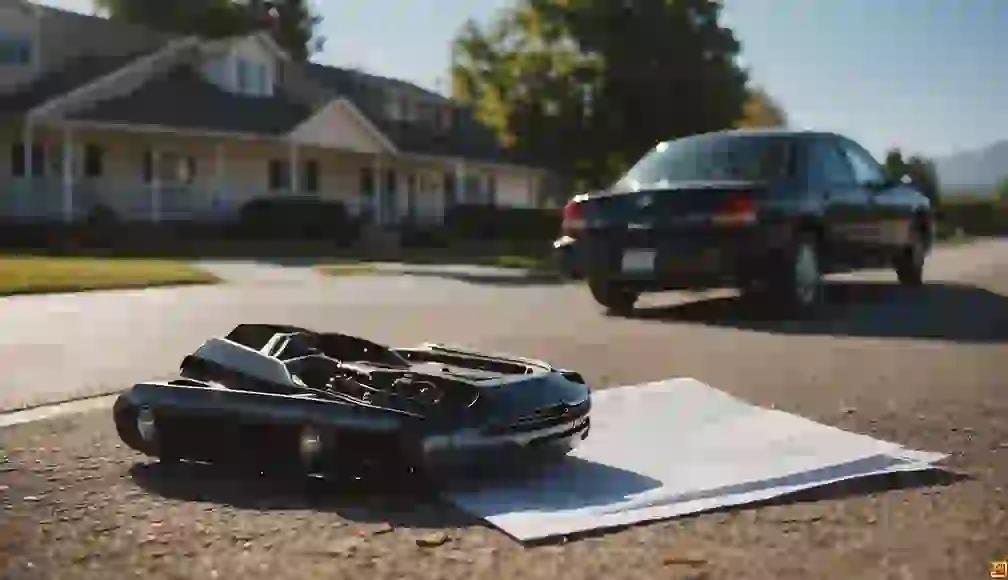The Truth About Car Title Loan Car Repossession: Risks and Alternatives
Car title loans can provide quick financial assistance for individuals in need, but they also come with potentially significant risks. One of the most daunting aspects of taking out a car title loan is the possibility of car repossession. In this article, we’ll delve into the truth about car title loan car repossession, discussing the process, legal rights, and protections for borrowers, and the financial implications of these loans.
|
|
Repossession can be a stark reality for those who find themselves unable to make timely payments on their car title loans. Understanding the process is crucial, as it equips borrowers with the right knowledge to navigate their options and take necessary steps to either avoid repossession altogether or manage the consequences more effectively.
Next, we will explore strategies for borrowers to handle a potential repossession situation and the actions they can take after repossession.
Key Takeaways
- Understand the risks and process of car repossession in car title loans
- Be aware of borrower rights and protections in repossession situations
- Explore options and strategies to avoid or manage car repossession consequences
The Truth About Car Title Loan Car Repossession
When you take out a car title loan, you’re using your vehicle as collateral. This means that if you fail to make timely payments, the lender has the right to repossess your car.
In this section, we’ll discuss the truth about car title loan repossession and what you need to know to protect yourself and your vehicle.
It’s essential to understand the risks involved. If your car is repossessed, the lender may charge a repossession fee. This fee must be reasonable, but the court determines what constitutes reasonable, taking into account the type of vehicle, how it was taken, and where it was taken1. If you want to be prepared, ask your lender for a list of the repossession costs.
Hiding your vehicle to avoid a repossession is one tactic some might consider. Unfortunately, this approach rarely works and could worsen your situation2. Instead of attempting to hide your car, it’s advisable to communicate with your lender to negotiate a payment plan or work out a solution.
When your car is repossessed, you might still have a chance to recover it. Some options include:
- Paying off the loan balance in full, including collection fees3.
- Redeeming the vehicle by paying the outstanding debt before it is sold at auction.
- Refinancing the loan with a different lender, which could potentially lower your monthly payments.
Being proactive is vital to prevent car repossession. If you are struggling to make payments or foresee potential difficulties, reach out to your lender and discuss your options. Remember, repossession should be a last resort for the lender.
Knowledge is power. Familiarize yourself with your rights and legal protections regarding car title loans and repossession. This understanding will equip you with the tools needed to navigate the process effectively and possibly recover your vehicle.
The Process of Car Repossession
Default and Notice
When you take out a car title loan and fail to make the payments on time, you may enter into a state of default. The exact number of missed payments before a default is declared varies depending on the lender’s policies.
Upon defaulting, your lender has the legal right to repossess your vehicle. In most cases, lenders will notify you of the default and provide you with a grace period to catch up on payments.
During this grace period, make sure to communicate with your lender and try to resolve the outstanding payments.
Repossession Actions
If you are unable to resolve the default and the grace period ends, your lender will proceed with repossession. The process of physically repossessing a car varies by jurisdiction and lender policies.
Lenders typically use a third party repossession service which locates your vehicle and takes possession of it without your prior consent. In some cases, lenders may even deploy electronic disabling devices to prevent you from using your car.
During this step, make sure to be aware of your rights and understand that certain actions by the repo company, such as breaching the peace, can be unlawful.
After the Repo: Next Steps
Once your vehicle is repossessed, the lender will typically sell it to recover the outstanding loan balance. If the car sells for less than what you owe, you may still be responsible for paying the deficiency. Additionally, you may also be responsible for the repossession fees and related costs.
After a car repossession, your credit score will likely be negatively impacted. It’s important to take steps to repair your credit and prevent future repossessions. Some steps you can take include:
- Seeking financial counseling to help manage your debt
- Creating a budget and prioritizing essential expenses
- Regularly monitoring your credit score and report
Legal Rights and Protections
Borrower’s Rights
When dealing with car title loans and repossession, it’s essential to understand your legal rights and protections as a borrower.
You have the right to receive written notification of a default, and the lender must provide you with a grace period to make up for missed payments. Furthermore, your lender must give public notice of an impending repossession and allow you to pay off the balance in order to keep your vehicle.
Repossession agents are not allowed to use force or threats to take your car, nor can they cause damage to your property. If you feel your rights are being violated, contacting the appropriate consumer protection agency or your state’s attorney general may help you resolve the issue.
Military Protections
If you are an active duty member of the military, you may be eligible for certain legal protections regarding car title loans and repossession.
Under the Servicemembers Civil Relief Act (SCRA), military personnel have increased legal rights. This includes a lower interest rate on your loan, and in some cases, protection from repossession while deployed.
Be sure to discuss your military status with your lender and keep them informed of any changes.
State Laws and Regulations
Car repossession laws vary by state, so it’s essential to become familiar with your local regulations.
Some states require the lender to send a Right to Cure notice, giving you a chance to make up for missed payments before repossession occurs.
Use the following resources to gather more information:
- Your state’s attorney general: They enforce consumer protection laws and can help with disputes involving car title loan companies.
- Your state’s Department of Banking and Finance: They regulate financial institutions and can provide information about legal protections and guidelines.
- National Conference of State Legislatures website: This site provides an overview of state laws related to car title loans and repossession.
Financial Implications of Car Title Loans
Understanding Fees and Expenses
When obtaining a car title loan, it’s essential to be aware of the various fees and expenses that come with these loans.
Typically, car title loans have high interest rates and may include various additional fees, such as origination fees, processing fees, and late payment penalties.
As a borrower, you should carefully review your loan contract to fully understand the costs associated with the loan. Keep in mind that these loans are usually short term, and it’s crucial to budget accordingly to ensure you can pay off the loan promptly.
Credit Implications
Your credit score and credit report also play a role in car title loans. Late or missed payments can negatively impact your credit score, causing long term financial consequences. Furthermore, if you default on the loan and your vehicle is repossessed, it will be noted on your credit report. This repossession will damage your credit and may decrease your chances of obtaining credit in the future. To avoid these credit implications, always make sure you manage your loan responsibly and make timely payments.
Dealing With Deficiency Balances
In a car title loan repossession scenario, the lender will sell the repossessed vehicle to cover the outstanding loan balance. However, if the sale amount does not cover the full loan balance, you may be left with a deficiency balance. This means you are still responsible for paying the remaining amount on the loan, despite having lost your vehicle.
It’s crucial to understand your rights and options in such situations, as deficiency balances can lead to further financial strain. Communicate with your lender to negotiate payment plans or discuss alternative solutions. Addressing the deficiency balance promptly can help you avoid negative credit implications and move forward financially.
Options to Avoid Repossession
Repayment Plan Negotiation
One of the best ways to avoid repossession is to contact your lender and negotiate a new repayment plan. If you’re experiencing financial difficulties, your lender might be willing to work with you to create a payment plan that better suits your situation. This could include extending the loan term, lowering your interest rate, or even offering a temporary payment reduction. Be proactive and transparent about your circumstances to increase your chances of a successful negotiation.
Redeeming the Vehicle
If your car is already in the process of being repossessed, you still have an opportunity to get it back by redeeming it. Redeeming the vehicle involves paying off the entire outstanding balance of the loan, along with any fees and charges associated with the repossession process. This option might be suitable if you can find the necessary funds from other sources, such as personal loans or borrowing from friends and family. Bear in mind that the timeframe to redeem the vehicle is limited, so you must act quickly to avoid losing your car permanently.
Voluntary Repossession and Its Benefits
In some cases, you may want to consider voluntary repossession as a way to avoid the negative consequences of an involuntary repossession. By voluntarily surrendering your car, you can significantly reduce the fees and costs involved in the repossession process, such as towing and storage fees. Additionally, a voluntary repossession is less damaging to your credit score compared to an involuntary one. Although you will still need to address the deficiency balance, this option can help you regain control of your financial situation and minimize the long term impact on your credit.
Strategies to Manage and Resolve Repossession
In order to address car title loan repossession, you can consider several strategies that are proven to be effective. Here are three possible approaches that you can explore in order to manage and resolve this issue.
Reinstating the Loan
Reinstating the loan involves bringing your outstanding debt up to date by paying the overdue amount, any penalties, and fees. This will not only restore your loan terms but also get your car back if it has been repossessed. In most cases, you will need to reach an agreement with the lender before you take this step. It is essential to maintain clear and open communication with your lender to ensure a smooth process.
- Pros: Quick resolution, vehicle returned (if repossessed), no lasting impact on credit score
- Cons: May be challenging to come up with needed funds, may need to renegotiate initial loan terms
Refinancing the Auto Loan
Refinancing involves taking out a new loan with different terms to replace your current title loan. This strategy might help you secure a lower interest rate, reduce monthly payments, or extend the repayment period, and as a result, avoid repossession. It is important to search for a reputable lender and carefully review the terms of the refinanced loan to ensure it is favorable for your financial situation.
- Pros: Potentially lower interest rate, lower monthly payments, longer repayment period, buy time to resolve financial difficulties
- Cons: Interest paid over the life of the loan may be higher, may need to secure additional collateral or a co-signer, not guaranteed approval
Bankruptcy as an Option
As a last resort, filing for bankruptcy may provide temporary relief from repossession. When you file for bankruptcy, an automatic stay goes into effect, which prevents creditors from taking actions like repossession or wage garnishment. Keep in mind that bankruptcy should only be considered if you have exhausted all other options.
- Pros: Automatic stay, possibility for debt restructuring in Chapter 13 bankruptcy, time to develop a long term debt management plan
- Cons: Severe impact on your credit score, repossession may still occur depending on bankruptcy type and case outcome, legal fees involved
Post Repossession Actions
When your car gets repossessed due to a title loan default, it is essential to understand the post repossession actions. In this section, we will cover the critical steps and considerations in the process, such as retrieving your personal items, the auction process, and deficiency judgments and settlements.
Retrieving Personal Items
After the repossession, your first concern should be to retrieve any personal property left in the vehicle. Typically, the lender must provide you with a written notice outlining the steps to claim your belongings within a specific time frame. It is crucial to act promptly and follow the instructions provided by the lender to ensure the safe return of your personal items. Remember, state laws may vary on this matter, so it’s essential to be aware of your local regulations.
The Auction Process
Once your car has been repossessed, it’s often sold at a public auction to recoup the outstanding loan balance. You will typically receive a notice of the auction’s date, time, and location. You have the right to attend and bid on your car, but remember, the goal is to pay off your loan.
Before the auction, it is advisable to research the current market value of your repossessed car and bring this information with you. It can help you make informed decisions during the bidding process. Remember that if the car is sold for an amount less than the outstanding balance, you might still be held liable for the difference, known as a deficiency.
Deficiency Judgments and Settlements
A deficiency judgment occurs when the auction proceeds don’t cover the outstanding loan balance. If this happens, the lender may pursue legal action to collect the difference from you.
However, there is still room for negotiation. Reach out to your lender and discuss the possibility of a settlement. They might be willing to reduce the amount owed or offer a payment plan to avoid costly legal proceedings.
Keep in mind that a deficiency judgment and settlement can impact your credit score. This makes it essential to work proactively and communicate with your lender to find the best solution for your situation.
Frank is now in charge of content creation. He has read Jer's How to Start a Car Title Loan Business book and has been personally trained in the industry by Jer. All content will be reviewed and approved of by Jer. He did all of the web design for this site, SEO, and online promotion. He is a seasoned website designer and content creator with a career spanning over two decades. My journey in this field began in 1997, and I’ve been specializing in WordPress and content creation since 2007. With a deep understanding of Search Engine Optimization (SEO), I’ve been optimizing websites for search engines since 1998. My expertise lies in manipulating the back end code of WordPress sites and crafting high quality, SEO friendly content to maximize their potential. I believe that compelling content is at the heart of every successful website, and I strive to create unique, engaging content that drives traffic and conversions. I learn fast and become an expert as needed.
Frank.Masotti@Gmail.com
3432 Skips Lane
Phoenix AZ, 85012
(602) 888-3448
| Frank Masotti | Google fundamentals of digital marketing certified |
| Premium Content Creators | Internet Service Agency |
| Linked In | X/Twitter |
| Medium | |
| YouTube | TikToc |



